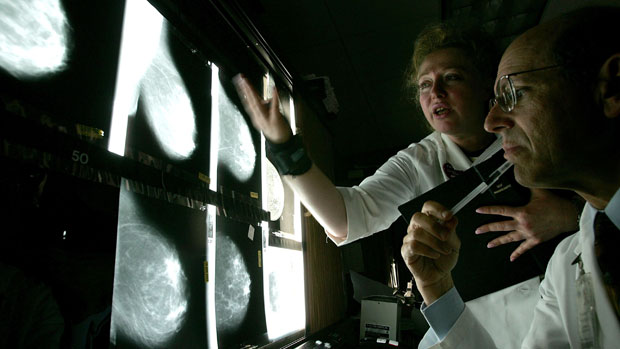Coronavirus: why cancer deaths may increase by a fifth
Researchers say delays to referrals and treatment are likely to cost many thousands of lives

A free daily email with the biggest news stories of the day – and the best features from TheWeek.com
You are now subscribed
Your newsletter sign-up was successful
Almost 18,000 more people with cancer may die over the next year in England as a result of the coronavirus crisis, according to a new analysis.
Researchers predict that an extra 6,270 people who have been newly diagnosed with cancer, and 17,915 already living with the disease, will die because of the pandemic - about 20% more than the usual total annual death toll.
What do the researchers say?
The Week
Escape your echo chamber. Get the facts behind the news, plus analysis from multiple perspectives.

Sign up for The Week's Free Newsletters
From our morning news briefing to a weekly Good News Newsletter, get the best of The Week delivered directly to your inbox.
From our morning news briefing to a weekly Good News Newsletter, get the best of The Week delivered directly to your inbox.
The new study, by experts at University College London (UCL) and Data-Can, a health data research hub for cancer diagnosis and treatment in the UK, is the first to quantify the potential impact of the coronavirus pandemic on cancer outcomes.
The analysis is based on information from the health records of more than 3.5 million patients in England and on weekly figures from major cancer centres in the UK.
A comparison of the data reveals a 76% average drop in urgent referrals from GPs for suspected cancer patients since the coronavirus crisis began.
“That is evidently very worrying as early diagnoses have been found to significantly improve cancer patients’ survival rates,” says the Financial Times.
A free daily email with the biggest news stories of the day – and the best features from TheWeek.com
The head of the NHS has previously said that early diagnosis increases patients’ chances of living by around 18 times.
The new study also found that attendance for chemotherapy has dropped by around 60% since the coronavirus hit the UK in February, despite NHS England insisting that cancer treatment “should continue unaffected” even as other non-urgent treatments are scaled back to save resources.
The reseachers predict that the total cancer death toll could rise from 89,576 to 107,491 in just one year as a result of the pandemic.
The Guardian reports: “While some of the projected additional deaths will be among people with cancer who contract Covid-19, others will occur because diagnosis was late or treatment such as chemotherapy was delayed, the researchers conclude.”
Why is this happening?
The new study suggests a range of possible reasons for the sharp decrease in referrals and treatment.
Co-author Professor Harry Hemingway, director of the UCL Institute of Health Informatics, said: “There are many factors operating here, including rapid changes to diagnosis and treatment protocols, social distancing measures, changes in people’s behaviour in seeking medical attention and [the] economic impact of Covid-19, as well as deaths due to Covid-19 infection.”
Hemingway told the FT that while NHS policy was designed to “protect cancer patients by not bringing them to hospitals where they could acquire the infection”, an “unintended consequence... is there’s a response in the public to maybe say, ‘I don’t want to burden the NHS, and I don’t want to present for my urgent diagnostic referral’”.
“The question is whether the net effect of that is adverse if the consequence is later diagnosis or not getting the access to surgery now,” he added. “That’s the concern.”
–––––––––––––––––––––––––––––––For a round-up of the most important stories from around the world - and a concise, refreshing and balanced take on the week’s news agenda - try The Week magazine. Start your trial subscription today –––––––––––––––––––––––––––––––
And the reaction?
Macmillan Cancer Support has warned that the disease must not become “the forgotten C” during the coronavirus crisis.
The charity’s chief executive, Lynda Thomas, said: “This research shows the possible extent of the direct and collateral damage caused by coronavirus on the health of our nation and to the lives of people living with conditions like cancer. It’s extremely worrying that we are likely to see an increase in deaths of people newly diagnosed with cancer.
“We are calling on all governments to stop cancer becoming the forgotten C and urgently ensure cancer services are getting everything they need to recover and catch up as quickly as possible from the disruption of the pandemic. This means having the right staff, protective equipment and testing to deliver safe care.”
NHS England has launched a campaign urging people with symptoms of any potentially serious illness to seek help in the normal way, by visiting a GP or A&E or by dialling 999, Sky News reports.
-
 Gisèle Pelicot’s ‘extraordinarily courageous’ memoir is a ‘compelling’ read
Gisèle Pelicot’s ‘extraordinarily courageous’ memoir is a ‘compelling’ readIn the Spotlight A Hymn to Life is a ‘riveting’ account of Pelicot’s ordeal and a ‘rousing feminist manifesto’
-
 The EU’s war on fast fashion
The EU’s war on fast fashionIn the Spotlight Bloc launches investigation into Shein over sale of weapons and ‘childlike’ sex dolls, alongside efforts to tax e-commerce giants and combat textile waste
-
 How to Get to Heaven from Belfast: a ‘highly entertaining ride’
How to Get to Heaven from Belfast: a ‘highly entertaining ride’The Week Recommends Mystery-comedy from the creator of Derry Girls should be ‘your new binge-watch’